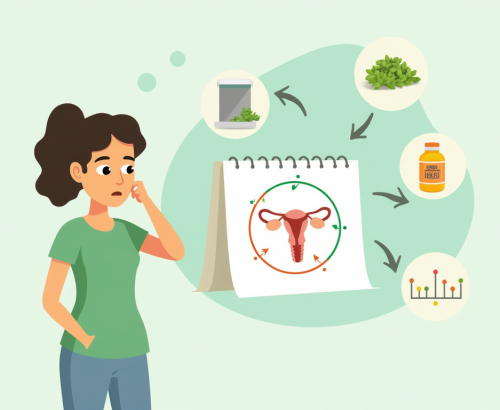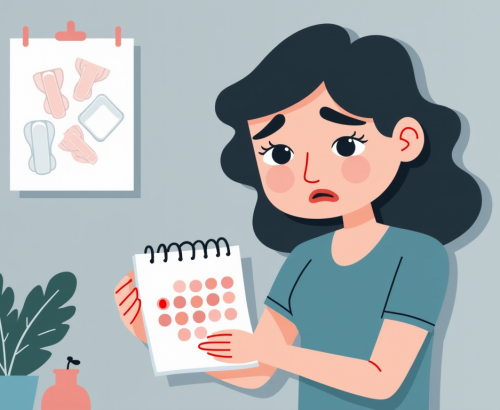
Irregular periods can be confusing and frustrating, but understanding why they happen and how to manage them can make things easier. If your menstrual cycle is unpredictable or not following the usual pattern, you’re not alone. This guide will help you understand the common causes of irregular periods and what you can do to manage them.
What Are Irregular Periods?
Irregular periods mean your menstrual cycle isn’t consistent. For most people, a normal cycle lasts between 21 and 35 days. Irregular periods might be too short, too long, or just unpredictable. You might have missed periods or experience heavy bleeding when you normally wouldn’t.
Common Causes of Irregular Periods
Hormonal Imbalances
Your menstrual cycle is controlled by hormones. If your hormone levels are off, it can lead to irregular periods. Conditions like polycystic ovary syndrome (PCOS) or thyroid issues can cause these imbalances.
if you think hormones are causing your irregular periods, see a doctor. They might run tests to check your hormone levels and suggest treatments like hormonal birth control or medication to help balance things out.
Stress
Stress can mess with your hormones, leading to irregular periods. High stress levels can cause you to skip periods or have unpredictable cycles.
Try to manage stress through activities like yoga, meditation, or exercise. Talking to a counselor or therapist can also help if you’re feeling overwhelmed.
Weight Changes
Gaining or losing a lot of weight can affect your period. Both being underweight and overweight can disrupt your cycle due to changes in hormones.
Aim for a healthy weight with a balanced diet and regular exercise. If you have big weight changes, consider talking to a nutritionist or doctor for advice.
Polycystic Ovary Syndrome (PCOS)
PCOS is a condition where the ovaries have small cysts and produce extra male hormones. This can cause irregular periods and make it hard to get pregnant.
Treatment for PCOS often includes medications to regulate your period or manage symptoms. Your doctor might also suggest lifestyle changes like diet and exercise.
Thyroid Problems
Your thyroid gland controls many body functions, including your menstrual cycle. Problems with the thyroid, like hypothyroidism or hyperthyroidism, can lead to irregular periods.
A simple blood test can check your thyroid levels. If you have thyroid problems, your doctor will give you medication to help regulate your thyroid, which can also help with your periods.
Uterine Conditions
Conditions like fibroids (non-cancerous growths in the uterus), endometriosis (where tissue similar to the lining of the uterus grows outside it), or polyps can cause heavy bleeding and irregular periods.
Your doctor may suggest treatments like medication, hormonal therapy, or surgery, depending on the condition. Regular check-ups can help manage these issues.
Menopause and Perimenopause
As you approach menopause (usually in your late 40s or early 50s), your periods may become irregular. This is because your ovaries are gradually producing fewer hormones.
Irregular periods are normal during perimenopause. Maintaining a healthy lifestyle can help with symptoms. If you have severe symptoms, talk to your doctor about treatments that can help.
Birth Control
Some types of birth control, especially hormonal methods, can affect your periods. You might experience irregular bleeding or lighter periods.
If you’re having issues with your period while using birth control, consult your doctor. They might adjust your prescription or suggest another method that suits you better.
Solutions for Managing Irregular Periods
Track Your Cycle
Keeping track of your menstrual cycle helps you and your doctor understand what’s normal for you and spot any patterns or irregularities.
Use a period tracking app, a calendar, or a journal to record the start and end dates of your periods, flow, and any symptoms. This information can be helpful in diagnosing issues.
Adopt a Healthy Lifestyle
Eating well, staying active, and getting enough sleep can support your overall health and help regulate your menstrual cycle.
Aim for a balanced diet with plenty of fruits, vegetables, whole grains, and lean proteins. Include regular exercise, such as walking or cycling, and make sure you get adequate rest.
Consult a Healthcare Provider
A healthcare provider can help determine the cause of your irregular periods and recommend treatments.
Schedule an appointment with your doctor or gynecologist. They may perform tests, review your medical history, and provide a treatment plan based on your symptoms and findings.
Manage Stress
Reducing stress can help regulate your menstrual cycle and improve overall well-being.
Practice stress-relief techniques like deep breathing exercises, meditation, or yoga. Engaging in hobbies and spending time with loved ones can also help reduce stress.
Consider Dietary Supplements
Certain supplements, such as magnesium, vitamin D, and omega-3 fatty acids, might support hormonal balance and menstrual health.
Before starting any supplements, talk to your doctor to ensure they’re appropriate for you and won’t interact with any medications you’re taking.










